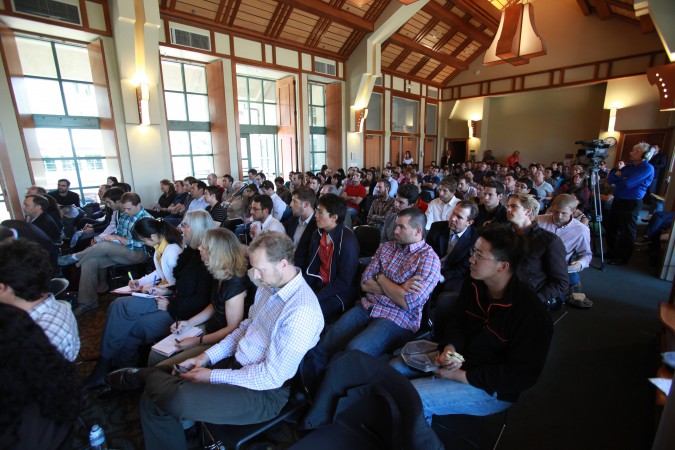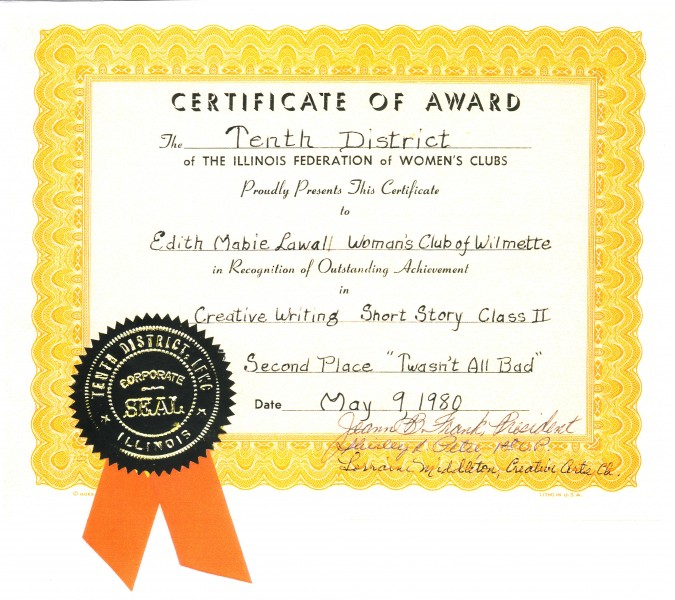Archive for the ‘att’ tag
AT&T CEO Randall Stephenson is interviewed September 6, 2012 by Rich Lyons, the Dean of the Haas School of Business at University of California Berkeley
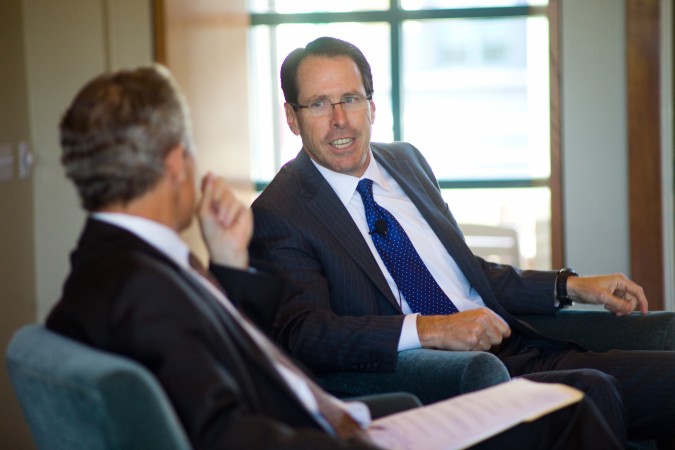
Rich Lyons, Dean of the Haas School of Business at UC Berkeley interviews Randall Stephenson, the CEO and Chair off ATT, September 6, 2012. Photograph by Kevin Warnock.
On Thursday, September 6, 2012, I attended the Dean’s Speaker Series at the Haas School of Business at the University of California at Berkeley, in Berkeley, California USA.
This was the first Dean’s Speaker Series I have attended.
I have been aware of this series for years, but I assumed attendance was restricted to friends of the Dean, Rich Lyons, because of the name of the event.
I’ve met and spoken with the Dean about ten times over the years, I estimate, including when he was the Acting Dean when Dean Tom Campbell took a leave of absence to help then Governor Arnold Schwarzenegger manage the finances of the State of California.
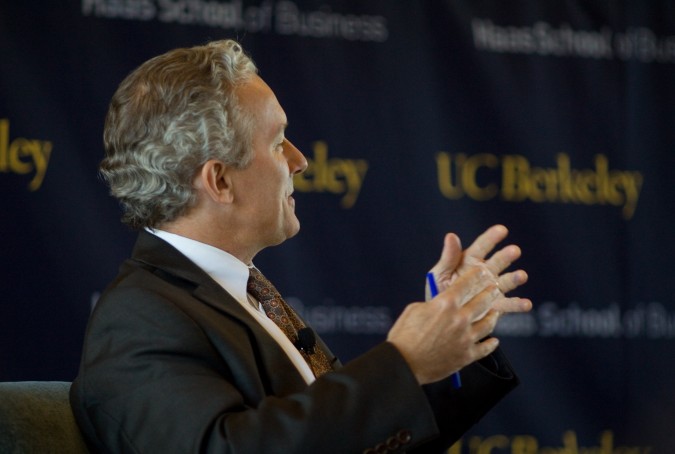
Rich Lyons, Dean of the Haas School of Business at University of California Berkeley, asks Randall Stephenson a question, September 6, 2012. Photograph by Kevin Warnock.
A couple of weeks ago I was looking over the Haas website and marveled at the outstanding list of upcoming individuals the Dean will be interviewing on stage. There in front of me were the magic words — the events are open to members of the Haas ‘community.’ I was pretty sure I qualified, since I am a sponsor of one of the school’s premier events, the Berkeley Startup Competition, and have been every year since 2000. I inquired and I got a seat — I was and am thrilled.
The Dean’s guest for this event was Randall Stephenson, the Chief Executive Officer of AT&T, the largest telecommunications company in the United States.
I am an AT&T customer, both for my home’s broadband Internet connection and for my wireless Apple iPhone 3GS, which I bought soon after launch. I no longer have a wired phone. I like AT&T’s service — I get great reception and few dropped calls.
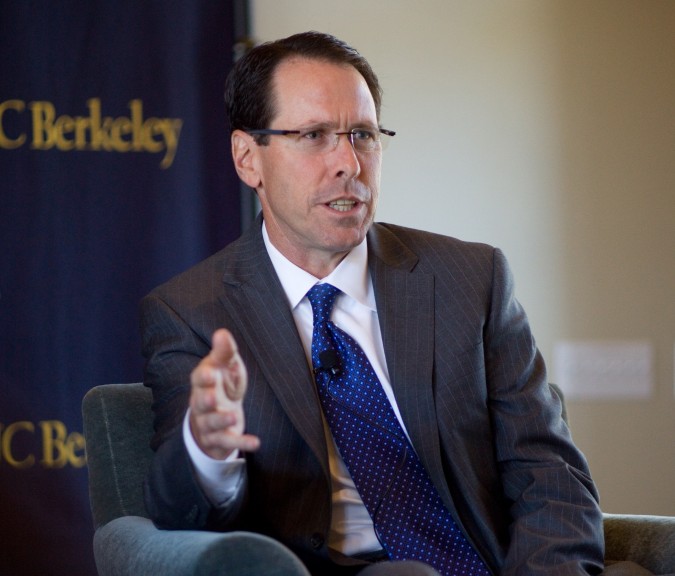
Randall Stephenson, Chair and CEO of AT&T, photographed by Kevin Warnock on September 6, 2012 at UC Berkeley
My regard for AT&T went up after listening to Stephenson speak for an hour. Stephenson was Chief Financial Officer and Chief Operating Officer prior to becoming Chair and CEO, among many roles.
He started at a job he called a ‘tape monkey’ at Southwest Bell Telephone in 1982 loading 19 inch diameter magnetic tapes of billing data onto tape drives. He did this work 12 hours a day — reading a video screen for instruction on which tape to load, finding the tape in storage, loading the tape and then pressing ‘Run.’
I did this same job, though not full time and not for 12 hours a day, when I worked at Cooley LLP. Thankfully I only had to do this role about two weeks a year, when the regular tape technician, Bill Calhoun, went on vacation.
Stephenson said he figured a way to rework his tape loading job to make it much more efficient and enjoyable, though he didn’t tell us the details of what he changed.
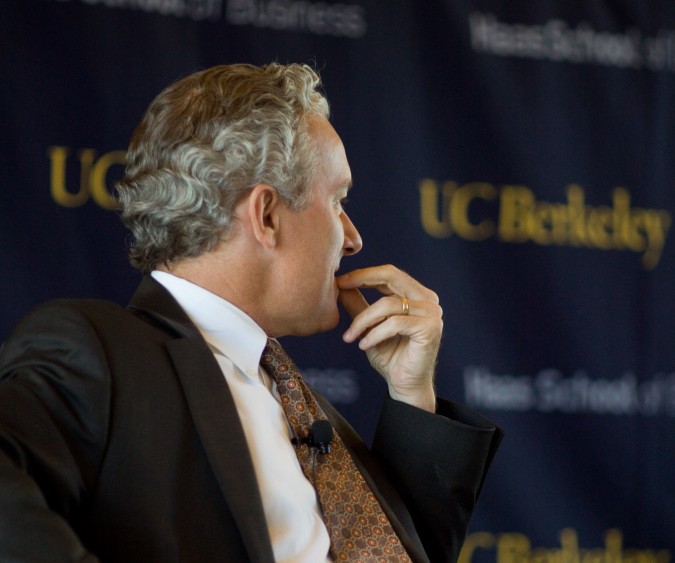
Rich Lyons, Dean of the Haas School of Business at University of California Berkeley, listens to Randall Stephenson answer a question, September 6, 2012. Photograph by Kevin Warnock.
During his introductory remarks, Rich Lyons said Stephenson worked in Mexico City as SBC’s Director of Finance.
At some point, Stephenson worked in Mexico for Carlos Slim, the iconic leader of Telmex. Stephenson did not explain how he came to work for Carlos Slim, who presumably was not an SBC employee at any point in his life.
Stephenson said Carlos Slim is ‘the most inherently brilliant individual that I’ve ever worked with.’
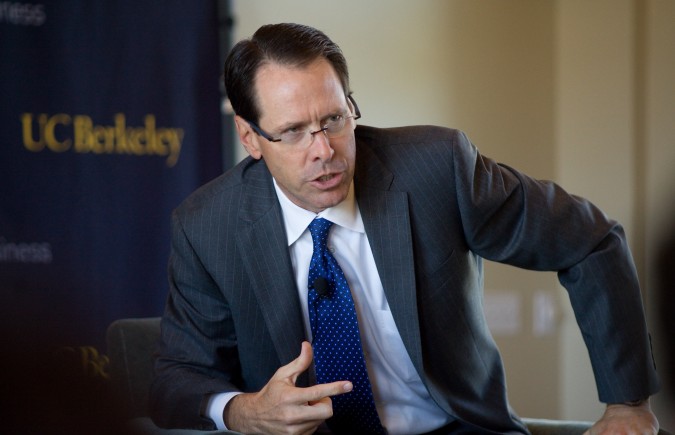
Randall Stephenson, CEO and Chair of AT&T, speaks at University of California at Berkeley, September 6, 2012. Photograph by Kevin Warnock.
Stephenson was in Mexico working for Slim in 1994 when there was an economic crisis that began December 19, 1994, when the Mexican government lifted all restraints on the Mexican Peso and let its value float. The Mexican currency lost 40% of its value in one day, Stephenson recalled.
Slim had 20,000 wireless subscribers in 1994, and thanks in part to the aggressive investments Slim made in the aftermath of the economic crisis of 1994, TelMex now has over 200 million wireless subscribers and Slim has made himself reportedly the wealthiest man in the world.
Stephenson took his job as CEO in June 2007 when ATT was a $100B annual revenue company with 300,000 employees, the same month that Apple launched its first iPhone. Stephenson invested heavily when the 2008 financial crisis came.
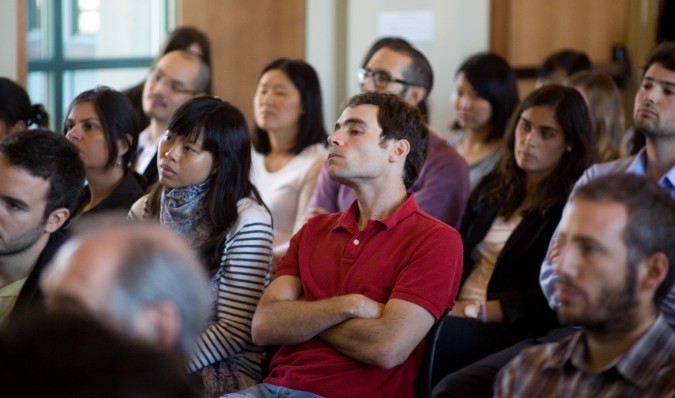
University of California Berkeley students listen to AT&T CEO and Chair Randall Stephenson speak, September 6, 2012
Stephenson said that 170,000 of AT&T’s employees actively participate in its TIP — The Innovation Pipeline — system conceived by the company’s CTO, a guy so tough to hire that it took ten years for Stephenson to do so. This system allows employees to propose ideas for the company to work on developing. People vote on the ideas and the best ones that float to the top are funded and pursued. In response to a question from a student in the audience, Stephenson said that apart from advertising the program to employees the company does little to promote participation. He said participation is quite good.
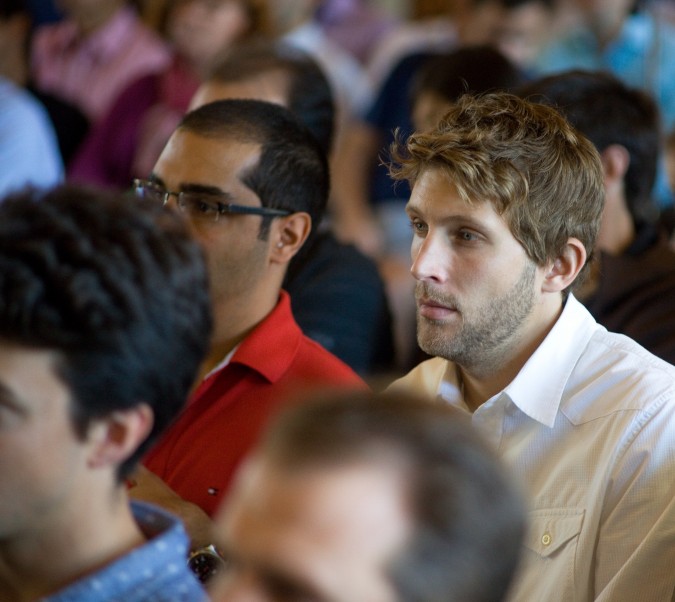
University of California Berkeley students listen to AT&T CEO and Chair Randall Stephenson speak, September 6, 2012
Stephenson and and his public relations person Larry (last name not mentioned) said they were so excited about a couple of their ‘tattooed up’ technologists in their Palo Alto, California research lab named the ‘Foundry’ that they put photographs of them in AT&T’s Annual Report. Stephenson divulged that competitors now are ‘coming after’ these programmers trying to hire them away from AT&T.
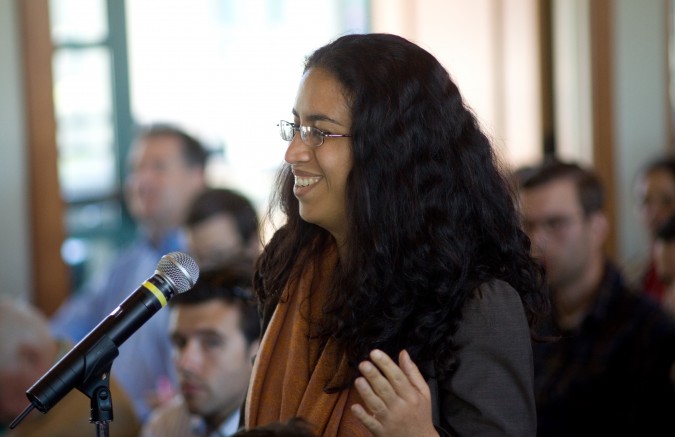
University of California Berkeley student asks AT&T CEO Randall Stephenson a question about AT&T's TIP suggestion system, September 6, 2012. Photograph by Kevin Warnock.
A student from the audience asked Stephenson to discuss wireless handset subsidies. Stephenson answered at length and concluded that the current system in the United States is overwhelmingly what customers want. He said AT&T performed studies where customers were asked if they would like to finance a phone via a separate finance contract, in exchange for markedly lower rates for service. Stephenson said customers did not like this proposal.
I think the survey respondents that answered this way are short sighted.
The way things operate in the United States, where one can buy a USD $700 iPhone for $200 because of the carrier subsidies, there is a perverse incentive to upgrade your phone exactly every two years. That is because contracts generally run for two years. If you keep a phone for three years, that final year you are paying much more than is warranted for service.
People should be encouraged to save money, not spend, so I admire the relatively new system reported by Stephenson to be the norm in Europe — phones are not subsidized and rates for service are [I hope] commensurately lower. Stephenson said phone sales dropped dramatically when this policy was implemented, but I say that is just what the world needs. People keep a home phone for decades. People keep televisions, stereos and other household appliances for years. Stephenson told me one-on-one after the event that fully 90% of his company’s customers upgrade their wireless phone every 14 months. Since contracts are two years long, 90% of its customers are paying early termination fees, which decline over time. That is a waste of the world’s resources, even in this day of a vibrant resale market for used mobile phones. I’m pretty sure a lot of people just throw their old mobile phones in a drawer, to benefit nobody. I understand mobile phones improve rapidly, and I do plan to get the latest iPhone when it’s available, having skipped the iPhone 4 and iPhone 4s. I just don’t approve of upgrading exceptionally frequently, which I consider 14 months to be.
I encourage AT&T and all carriers to offer unbundled rates for mobile service, as an option.
Rich Lyons is a good interviewer. The setting was photogenic — two handsome cushioned arm chairs on an elevated stage, with a small end table between the chairs. Lyons and Stephenson wore wireless lapel microphones. There was a backdrop behind the men that repeated the logos for UC Berkeley and the Haas School of Business, so the logos made it into every photograph of the people on stage. As a photographer, I applaud the Dean for creating such an inviting, warm and photogenic environment for his interviews. I look forward with enthusiasm to the next Dean’s Speaker Series interview, which I hope to be able to attend.
Former Haas Dean Dr. Laura D’Andrea Tyson is on the Board of Directors of AT&T, and presumably she helped Lyons recruit Stephenson to visit the Haas School. Tyson was Dean when I was a finalist in the Berkeley Business Plan Competition in 1999 with my company Hotpaper.
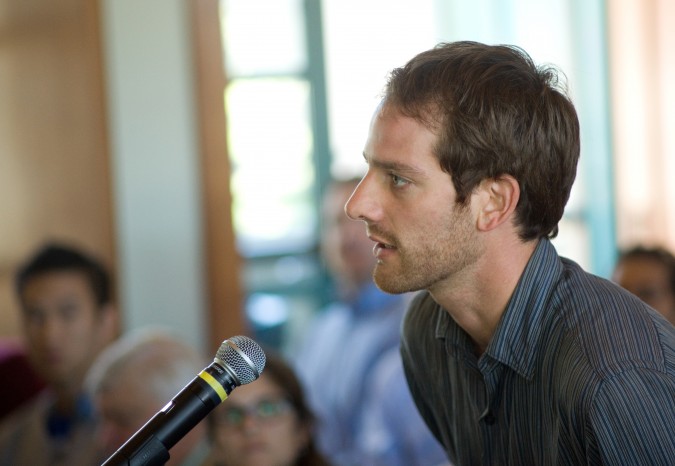
Student asks AT&T CEO and Chair Randall Stephenson a question about mobile handset subsidies, September 6, 2012, at University of California Berkeley
I took the photographs that accompany this blog post.
I used a Canon 5D Mark II camera with the following lenses: Canon 135mm soft-focus lens set to sharp, Canon 16-35mm L zoom lens. I upload pictures to this blog at maximum camera resolution at maximum image quality. Click on the photographs twice in delayed succession to see the full size images. If you would like to use these pictures, please send me a message. If the purpose is reasonable, I will allow usage. I enjoy having my pictures displayed elsewhere. I pursue photography only as a hobby, not as a profession.
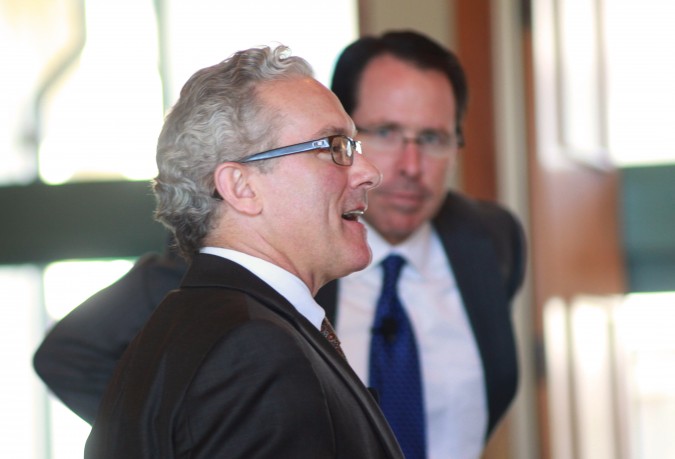
At the end of his interview, Rich Lyons stands with ATT CEO and Chair Randall Stephenson at the Haas School of Business, September 6, 2012. Photograph by Kevin Warnock.
Finally, I have some advice for Berkeley students reading this post — introduce yourself to the speaker.
I don’t recall seeing any students introduce themselves to Stephenson. I did see a professor and a president of a good sized company say hello, but that’s it. Stephenson spent several minutes talking with me because there was nobody waiting after me to speak with him. The room had rapidly cleared out. The interview was during the lunch hour, so perhaps the students had to be in class immediately after. It’s rare for so prominent a CEO to speak to such a small group — there were about 140 students in the room by my quick count. I’m sure Stephenson won’t be back this academic year. Make a point of meeting all such prominent speakers. In my mind, Stephenson should have been surrounded by dozens of students trying to shake his hand. Stephenson didn’t appear to be in a rush to depart, and I left before he did.
AT&T’s iPhone data billing is irritating
I love my Apple iPhone.
I have an 850 Anytime minute plan, which is just about right. I have the basic 200MB data plan, which is also just about right. I’ve gone over on the data plan just once, and I’m very careful to not go over, which doubles the cost for data that month.
On March 26, 2012 at 7:04am I received a text message from AT&T saying I had used 90% of my data plan for the month, which is the calendar month for my account. That meant I needed to consume less than 20 megabytes in the next five days. I was careful to limit my usage, staying on WiFi as much as possible and not checking my email in line at the grocery store, for example.
Thus I was upset when my bill arrived and it showed I had used 201 megabytes of data in March. That extra one megabyte cost me USD $15.00. I called to complain. I reviewed my data usage online during the support call with Brandon Hillhouse. I added up all the data I used on March 26-31, 2012, starting at 12:01am on March 26th. The total came to 17,970 KB or 17.548 MB. So I did not go over the 20MB that AT&T’s own text message said I had left as of March 26th.
Hillhouse told me that iPhone applications started on 3G stay on 3G even if you roam into WiFi coverage. He said the only way to force using WiFi is to shut down all apps explicitly via a menu I can not find on my phone. I have never heard of this, so I asked him if he was certain. He said he was. I then told him I was a journalist and planned to write about this and name him, so I wanted to be certain he was certain. He said he was certain, and he further said he deals with this issue on a daily basis. I advised him to write good notes on my account so that if he’s approached by his boss later he will remember our call well. He said he would write good notes.
I am wildly skeptical that Hillhouse has his information correct. I just don’t believe it. What’s the point of roaming into a WiFi area if you have to shut down everything to take advantage of the ‘free’ data on WiFi?
However, if Hillhouse is correct, this is news I think many people don’t know, which is why I am writing about it here. Let’s get a discussion going in the comments about this.
Hillhouse removed the USD $15.00 charge for going over. Thank you, I think. I told him charging me for an extra megabyte when their own bill shows 17.548 MB used after the text message looks like fraud to me. What’s probably happening is that text message was slightly incorrect, and probably should have not said 90% but the exact, precise value to several decimal points. According to the bill, I used 200.1924 megabytes in March. How nice for AT&T to round up rather than to the nearest megabyte. AT&T should send out accurate text messages that state exactly how much data remains. I suspect their messages are rounded to the nearest 10%, which caused this problem for me, because they probably rounded down. My long call with Hillhouse today must have cost AT&T at least USD $30 — a big waste.
I know I can buy 3 gigs of data for the price of 400 megs of data if I go over on my 200 meg plan. But I don’t want or need 3 gigs of data, and the data networks are already overtaxed, so I feel my frugality is bandwidth conservation, not cheapness. Also, I have a Verizon MiFi WiFi hotspot with 5 gigs of data per month, which I can use if I need to really consume a lot of data on the road from my iPhone. I justified getting that device and accompanying bill by cutting out my unlimited IPhone data plan that I had since I bought the original iPhone on launch day July 7, 2007.
Here’s my actual billing detail from the last charge on March 25, 2012, the day before the AT&T 90% consumed email. You can add up the numbers in the 6th column and learn that I did not use more than 20 megabytes of data during the rest of the month of March. But you can see in the 7th column on March 31, 2012 where AT&T decided to charge me USD $15.00 for going over 200 megabytes for the month.
| 177 | 03/25/2012 | 09:46PM | phone | Data Transfer | 1,757 KB | 0.00 | |
| 178 | 03/26/2012 | 09:58AM | phone | Data Transfer | 29 KB | 0.00 | |
| 179 | 03/26/2012 | 10:43AM | phone | Data Transfer | 39 KB | 0.00 | |
| 180 | 03/26/2012 | 12:20PM | phone | Data Transfer | 48 KB | 0.00 | |
| 181 | 03/26/2012 | 02:35PM | phone | Data Transfer | 35 KB | 0.00 | |
| 182 | 03/26/2012 | 03:20PM | phone | Data Transfer | 328 KB | 0.00 | |
| 183 | 03/26/2012 | 07:45PM | phone | Data Transfer | 16 KB | 0.00 | |
| 184 | 03/26/2012 | 08:10PM | phone | Data Transfer | 7 KB | 0.00 | |
| 185 | 03/26/2012 | 08:19PM | phone | Data Transfer | 44 KB | 0.00 | |
| 186 | 03/26/2012 | 09:19PM | phone | Data Transfer | 236 KB | 0.00 | |
| 187 | 03/27/2012 | 10:13AM | phone | Data Transfer | 1 KB | 0.00 | |
| 188 | 03/27/2012 | 10:13AM | phone | Data Transfer | 1 KB | 0.00 | |
| 189 | 03/27/2012 | 10:25AM | phone | Data Transfer | 67 KB | 0.00 | |
| 190 | 03/27/2012 | 01:14PM | phone | Data Transfer | 418 KB | 0.00 | |
| 191 | 03/27/2012 | 09:17PM | phone | Data Transfer | 21 KB | 0.00 | |
| 192 | 03/27/2012 | 10:22PM | phone | Data Transfer | 3,791 KB | 0.00 | |
| 193 | 03/28/2012 | 04:15PM | phone | Data Transfer | 5 KB | 0.00 | |
| 194 | 03/28/2012 | 04:25PM | phone | Data Transfer | 14 KB | 0.00 | |
| 195 | 03/28/2012 | 05:08PM | phone | Data Transfer | 90 KB | 0.00 | |
| 196 | 03/28/2012 | 09:08PM | phone | Data Transfer | 911 KB | 0.00 | |
| 197 | 03/29/2012 | 03:46PM | phone | Data Transfer | 7 KB | 0.00 | |
| 198 | 03/29/2012 | 03:58PM | phone | Data Transfer | 184 KB | 0.00 | |
| 199 | 03/29/2012 | 09:38PM | phone | Data Transfer | 1,148 KB | 0.00 | |
| 200 | 03/30/2012 | 01:26PM | phone | Data Transfer | 7 KB | 0.00 | |
| 201 | 03/30/2012 | 01:51PM | phone | Data Transfer | 32 KB | 0.00 | |
| 202 | 03/30/2012 | 03:37PM | phone | Data Transfer | 8 KB | 0.00 | |
| 203 | 03/30/2012 | 04:24PM | phone | Data Transfer | 296 KB | 0.00 | |
| 204 | 03/30/2012 | 09:43PM | phone | Data Transfer | 2 KB | 0.00 | |
| 205 | 03/31/2012 | 01:27AM | phone | Data Transfer | 10,088 KB | 15.00 | |
| 206 | 03/31/2012 | 07:32PM | phone | Data Transfer | 97 KB | 0.00 |
Guest post by my grandmother Edith Lawall – ‘Twasn’t All Bad’
[This post is special. I am transcribing a story my late grandmother Edith Lawall wrote starting on October 29, 1979. She submitted it to a writing contest organized by The Illinois Federation of Women’s Clubs. The organization presented my grandmother on May 9, 1980 with a Certificate of Award for winning Second Place for the Tenth District. Edith Lawall is the mother of my mother Martha Warnock. My grandfather was married to my grandfather Russell Lawall. Here is a PDF format file that contains a scan of the original typed story: Edith Lawall story about 1929 market crash]
‘TWASN’T ALL BAD
The manuscript enclosed is one I wrote in a week’s time, beginning October 29, 1989. (This is the same date the U.S. stock market collapsed 50 years earlier.) For several days prior to this anniversary we were repeatedly informed by the media about this approaching event, which ushered in the Great Depression of Thirties. A quick review of my life at that time indicated it was a particularly exciting time for me too, but in a different sort of way. In my family’s situation little money and no stocks were involved. Immediately I felt impelled to record my memorable recollections. I began the story that day. And so it was.
As it worked out there were two incentives for me to write on this subject: 1. I hoped it might add personal interst for any Mabie family posterity. 2. I wanted to have something to enter in the Annual Creative Writing Contest, sponsored in various categories by the 10th District of Federated Women’s Clubs of Illionois, and possibly, the State Federation Contest. It seemed that the “Crash” was a timely subject, due to tis Worldwide repercussions.
Since my recollections came very easily, I did enjoy writing it, and I suppose I’m the only “Leaf” left on the Mabie-Westcott Family Tree, who might even know about these particular family events.
This “‘Twasn’t All Bad” narritive is being sent to Robert and Martha Warnock in San Francisco, California; David and Willa Samors Lawall of Charlottesville, Virginia; and Gilbert and Sarah Nesbit Lawall in Amherst, Mass. and their families. We hope the grandchildren will read it too.
Edith Roe Mabie Lawall, January 29, 1980
Edith Mabie Lawall
Short Story
2485 Words
Class II
‘TWASN’T ALL BAD
Today is October 29, 1979. Newspapers, television, and radio, have reminded us constantly that it is just fifty years since the Stock Market Crash. Pictures of wild crowds in the streets, and tales of the millions of paper assets which vanished, have been harrowing. Only those fifty-ish and upwards, can remember it, and the succeeding years that were affected by it. However, I am also reminded that it wasn’t all dismal, and I particularly recall one bright spot from this period, which I wish to sketch.
For the Mabie family, our personal Depression had already peaked, and begun to decline. Our scanty assets had never been invested in the Market. Instead, they had gone into higher education necessary for my sister, Helen, and myself, in tune with our desires to reach our musical aspirations. The minister father, Harry Mabie, and devoted wife, Esther, musically inclined themselves, cheerfully supplied the necessary funds, with the result, that by 1929, Helen and I had received Bachelor of Music Degrees, from the University of Cincinnati.
In September of 1929, father received a “call” to the pastorate of the East Baptist Church of Lebanon, Ohio, 25 miles by bus from Cincinnati. Coincidentally, Helen signed a contract to become Music Supervisor of the Bay Villiage Schools, (suburban Cleaveland) and I was made teacher of piano classes in our nearby Madisonville School.
I’ll never forget the thrill of packing the Chevy, full of overflow from our van, (including our pretty white cat); the lovely drive through lush Warren County; and getting settled in our new home. I had secured a suitable place to live in Cincinnati, in the home of one of our church members, near my school. I could go home to Lebanon for weekends and summer vacations. Helen had arrived in Bay Village in time to see many sad situations, following the Crash Day. Numbers of her school children had come from families that had been forced to give up their cherished Lake Shore homes, and seek cheaper living elsewhere. Farewells were hard!
In Lebanon, I was asked to take over the organist’s duties; teach in the Sunday School; and steer the young people’s Sunday Evening group.
An unexpected delight that both Helen and I could enjoy, was the golf course, nearby, where all the privileges were free to the local ministers and their families. A dear friend gave us some of his old clubs, balls were cheap, and we were most happy to get up at sunrise, hike to the Park, avail ourselves of the small mounds of dirt provided for “tees”, and do our practicing. Nearly always, we had the Park and the spacious golf course to ourselves and birds.
On a certain bright Monday morning in July, 1931, all of us rose early, for this was the day Father and Joe, (our adopted 12-year-old brother), were embarking on a combined business and fishing trip. The business entailed a church conference at Green Lake, Wisconsin, for father, with plenty of time on the side, to supervise Joe’s fishing in the Lake. They would camp out, as did many others, and cook their own meals. After an hour of frenzied thought and furious packing, they were off on the grand excursion.
A great calm descended on the household, but not for very long. Mother, Esther Westcott Mabie, was very much interested in family history, and had cherished records from many past generations. A Mr. Whitman, a (distant) Westcott was compiling a history, and he was very grateful for information which Esther had sent him. He wanted to host a reunion of all living Westcotts within reach, and had invited mother. He lived in Milford, N.Y. and had access to historic regions nearby. Mother planned to stay for at least a week, including visits with friends after the reunion. Her departure was scheduled for noon of the next day. There were still many things to be done.
Tuesday morning mother was out, doing errands, and Helen was busy in the kitchen, when the doorbell rang. I answered, and there stood a very personable young man, who introduced himself as Jesse Lyons, a Senior from Wooster College, and part of a “Peace Caravan” representing the American Friends Service Committee. He had gone to the office of our church, and asked where he might find the minister. He told the Secretary that he hoped to make arrangements, for himself and co-student, for a meeting where they could explain the mission of the Caravan. He was referred to our residence, and there he was. I invited him to come in, and explained that the minister was out of town for a week, but I was sure the arrangements could be made. Then he told me he was looking for a place for himself and his co-student Wendell, to stay for a few days. Without a moment’s hesitation, I said, “You can stay here”, and that was it.
Soon mother returned, and she was impressed with his serious interest in the cause of peace. She volunteered to arrange with a lady friend, to stay nights, as a chaperone during her absence. Jesse soon left to pick up his friend Wendell, and offered to help mother for errands, and to drive her to the bus station when needed. Meanwhile, Helen had come in, and she was happy to meet Jesse, and assumed the lunch preparations. And thus began a most delightful 8-day period for us all!
After seeing mother off, we soon worked out a cooperative routine. Naturally, Jesse and Wendell were eager to fall in with our early-rising golf routine, and we had enough clubs for all. Also, they indicated a desire to help with the housework. Jesse chose to do the vacuum cleaning and dusting. Wendell volunteered for dishwashing, in which he claimed exertise from camp experiences. Each would take care of his own washing, and either one would be available for driving to market, and odd jobs. Of course, Helen and I would be the cooks.
Plenty of time was found for long, deep discussions of philosophical problems. W did not ignore the Depression, but neither did we let it disturb us unduly. There were other subjects which we wanted to know about, for instance, how did they get started on this summer activity? We gathered that the Peace Caravan was instigated by the noted Quaker, Rufus Jones. it seemed to have some of the emotional and spiritual drive, that would in later years become the central motivating force of the Peace Corps of the John F. Kennedy era.
Both young men were keenly interested in their College Dramatic Department. A recent performance in which they had participated, was “Death Takes a Holiday”, a semi-serious play putting forth the possibility that there were always people who knew that their time had come, and were praying that it might be as soon as possible.
Another matter about which they were concerned, was their College Fraternity System. Both men belonged to Greek-letter Fraternities, but they were constantly running across fine students who had never been pledged. They felt something should be done about it. Jesse had finally persuaded his fraternity brothers to host a special monthly party for non-pledged people. The parties had been quite successful, and they hoped this would become a part of college activity programs.
One morning after our customary 2-hour period on the golf course, while we sipped cool lemonade, Jesse confided his future plans and problens. For some time he had been considering preparation as a missionary in the foreign field. However, with his uncertain home situation due to the frailty of his mother, he felt that he might set aside those plans, in favor of entering the ministry at home. He also expressed his firm belief in “Providential Guidance”, or “The Inner Light” as the Quakers expressed it. He said that he never made any of his talks, without a preliminary, prayerful meditation hour. Wendell had similar ideals, but apparently had not chosen a life work.
Another day, which turned out to be one of the warmest, around 100 degrees, we spent a part of our leisure time, getting ready for the evening appointment. Helen had been asked to furnish some music for a gathering at the local retirement home for “genteel” widows. She had a number of songs in mind, and seized the opportunity to try them out on us. It was lots of fun. Sometimes we all joined in, and Helen was never happier than when she could play the piano, and go from oone song to another, as fancy chose. Of course, some were appropriate, and some were not, and the decision for the evening finally boiled down to several which we all approved.
Upon our arrival at the lovely antique-filled old home, the hostess suggested that the men would be more comfortable on the front porch, sitting on the porch swing. Helen and I went in and greeted the ladies, who were just entering the parlor. All very pleasant, so far. Then there was the flurry of the arrival of the Cincinnati soloist, accompanied by two friends. They had to be introduced also, but we soon realized that the soloist knew many of the widows, as she had been there before, to sing. Helen ventured a mild remark about the heat wave we were having. The soloist spoke up, “Oh, was it hot today? I never notice the heat”. It was hard to think about what to say next, so we were very relieved when the hostess announced that the program was about to begin. She introduced the Cincinnati soloist, who went to the piano, sat down, and said, “I hope the piano keys are cleaner than they were the last time I was here.” But soon she started to play and sing, and I could see that she was a very gifted person, indeed. We all applauded enthusiastically. Then it was Helen’s turn. She sand “Du bist die Ruh” of Schubert, and the contemporary, “In the Time of Roses”. Then she smiled and announced that the last number would be, “The Big Brown Bear”, which she played and sang with great gusto. Everyone was carried away with the humor of the lyrics, and her original version of the accompaniment. The applause was almost equal to that of the professional. Then the boys were invited in, to tell about their “Caravan”. Jesse told them something of Rufus Jones, and his greatness as a speaker to the students, and the inspirations he, and many others had received. Cooling refreshments were served, we shook hands with everyone, and departed.
All too soon, the day of the “Caravan” departure arrived. One more early golf game, then breakfast and packing. We expressed our appreciation to them, as they did to us, and off they went!
When Helen and I returned to the kitchen, there were the breakfast dishes, neatly stacked in the sink, but no Wendell to wash them. We were both suffering an acute attack of Self-Pity. We sat down by the kitchen table, looked at each other, and burst into tears. Each of us had known that the let-down would have to come. We knew all along that the “Caravan” was like a ship that passed in the night, but oh, how much fun and inspiration we had enjoyed. Memories would last — well, probably longer than the Depression, and we were most thankful they were all happy memories.
Our return to normalcy was helped very much by two unexpected dinner invitations for the next two nights, from friends in our church. These were to honor former church members, visiting from New York. The next day, as Father, Mother and Joe returned from their vacations, we were ready to resume our regular routine also.
One good thing about writing a factual story about fifty years ago, is that it is possible to know, not just surmise, the sequel.
In June, 1933, when Helen came home for summer vacation, she was accompanied by a devoted girl friend, her brother Wilfred, and his best friend, Russell Lawall. Russell was about to be side-tracked for the rest of his life, by meeting me. Fortunately, he had a good job with the A.T.&T. Co for which he was well qualified by being a graduate of Earlham College, and holding a degree from Case Institute in Cleaveland. He was also a Birthright Quaker. The result of this and other visits, culminated in our lovely Quaker wedding in August. We immediately took up our residence in Detroit. Signs of business stagnation were evident everywhere. But we were very happy, and still are, forty-seven years later. I was often mindful of my good fortune in having learned about the Quaker’s tenets from our “Peace Caravan” students.
We had three children: Martha in July of 1934; David in August of 1935; and Gilbert in September of 1936. They were, and still are, a great joy to us. We moved in 1944 to Oberlin, Ohio and Russell commuted to work in Cleaveland. In 1957, he was transferred to Cincinnati, and it was while living there that I heard about Jesse Lyons again. I was waiting in a dentist’s office, and picked up a newspaper to read, and happened to see the church notices. One was headed, “New minister to be installed.” I soon saw that the new minister was Dr. Jesse Lyons, who would take his place the following Sunday, as one of the Staff Ministers at the Riverside Baptist Church in New York. Immediately, I knew there could be but one Jesse Lyons! And I was right!
Several years later, we were saddened to hear that a younger sister of my father, was dying of cancer in a New York hospital. It was sad to think of Janet, a gifted writer, alone in a big city in her last days, and I decided to write to Jesse and see if he could get someone to call on her. I also wrote about the death of my sister, Helen, of cancer in March of 1949. He responded with a beautiful letter, saying how well he remembered the week in Lebanon in 1931. He reported that he had delegated a staff member, a lady who was particularly good at cheering and counseling people, to carry out my request. Later she reported to him that she had found Janet weak, but still a most vibrant and interesting person, and they had talked together for an hour.
A half century later, how can we evaluated our present situation, so plagued with seemingly insoluable dilemmas in high places, as well as low? At least we can remember that God works in mysterious ways His wonders to perform, in season and out of season, in bad times as well as good. We must have steadfast faith that a better world will eventually emerge!
Note — This is a factual story, written entirely from my own memory.
January 25, 1980
Edith Roe Mabie Lawall
[Note from Kevin Warnock, the author of this blog — My grandmother lived in the village of Wilmette, Illinois USA when she wrote this story, at 711 Greenleaf, a house I will always remember from my many happy visits there. My grandmother Edith passed away in 1989 and my grandfather Russell passed away in 1994. I inherited his cherished grandfather clock, which I proudly display in my dining room at my house in San Francisco, California.]
False 911 call apparently due to scratchy phone line at my house
I had a strange visit from the San Francisco Police Department today. The nice officer said she was replying to a 911 call from my land line phone. She said nobody spoke during the 911 call, but the dispatcher heard a scratchy noisy line. My phone line did have a loud scratchy hum on it the few times I tried to use it last week. I didn’t investigate at the time, as I had my cell phone and just used that instead.
I showed the officer around my room to convince her nothing was wrong, at her request. I told her about the scratchy line quality, but she didn’t ask to check it herself. She was quite pleasant and soon departed, but advised me to call ATT to find out what’s wrong.
I checked the line immediately, and it was still scratchy and noisy. I called ATT on that line, as it was still possible to speak and hear on the line. ATT said it was probably an issue on their end and advised sending a technician to investigate. They warned that if the problem was mine that they would charge me $55. I told them I wanted to do some more tests on my own before committing to a possible charge, and told them not to send a technician. I am glad I did, as I fixed the problem within minutes of ending that call.
I eliminated the scratchy line by removing from the circuit an adapter that converted 1 phone jack into 2 phone jacks! This adapter was plugged directly into the ATT access box in my inside garage. When I plugged my phone directly into the access box without the adapter, the line was suddenly ‘like new.’ Had ATT made that test, they would have likely charged me $55, because I don’t think anything was wrong with their circuitry.
I did a search online to see if a noisy line could trigger a call to 911, and I found accounts written by others that said that it could. I didn’t know that until today.
We have been experiencing intermittent high speed Internet service, also from ATT over the same wire pair my phone uses, so I hope that by removing the faulty adapter that our Internet connection stability improves.
Note that my phone number is listed in the telephone book, so I am easy to reach.
